Meet the Scientist: Les Miranda, Executive Director of Research, Therapeutic Discovery

This profile is a part of the Amgen Foundation’s “Meet the Scientists” series, where we invite students and teachers to learn more about a scientist at Amgen and the work they do to create lifesaving medicines. Join the conversation by sharing your own experiences with @AmgenFoundation and @Amgen.
What do you do in a typical day?
Every day is different because the landscape of research is unpredictable. While you generally have a direction, every project dictates a custom set of questions that have to be tackled. Because of this, every day involves communicating and strategizing with people to understand where we stand on projects and our options going forward. The world around us is continually changing and this impacts us too.
What made you want to pursue your career?
When I left high school, I thought I wanted to go into computer science. However, during college in Australia, I was able to take both computer science and life science classes, and I realized the life of a computer scientist wasn’t for me. Life science resonated with me more and set me on a career path with a wide range of stimulating projects.
What motivates you each day?
I believe we are working on things that matter because we can help people suffering from grievous illness. Additionally, there is always an intellectual stimulation and challenge at work, but in the end, it’s about how we’re going to have a meaningful, lasting impact. While we don’t know what decisions or activities we make on a daily basis will be significant in the future, we know that trial and error can make a difference.
What are some exciting things you’ve done/are doing at Amgen?
I get to work at the front end of discovery research. Designing an entirely new molecule atom by atom to create a medicine is really cool and exciting these are one of kind things I also enjoy building and designing software to be more efficient in the drug discovery process, so I still get a taste of computer science. It’s amazing that science is interdisciplinary in this way.
What was your favorite subject in school?
You might be surprised to learn it wasn’t science, but instead geography. It allowed me to explore techniques in mapping and learn how the world evolved and works. For me, it was also a different way to understand measurements and scientific processes that we also use in science.
What kinds of skills do you use in your job?
The main skills I use in my job include:
- Patience with people, science and the organization. You can’t do this work alone.
- Flexibility is crucial. This is not the job I expected or even the same as when I started at Amgen 14 years ago. If you are rigid on when and what you want to do, science is not for you. The learning and evolution in science (as in many other careers) never stops – it’s important to embrace it!
- When you work in science, you have to be comfortable dealing with uncertainty. If you want to do something that is repetitive and rigid, science may not be for you. You have to be comfortable knowing that things will change.
What advice would you give to students interested in pursuing biotech?
Biotech is a very large field. There are many different career options and areas to pursue that you might not know about, including cell based, proteins, antibodies, RNA medicines and more. The only way you are really going to know what to do is by talking to a scientist in-person or from online resources like YouTube. When I first started exploring a career in science, I unfortunately didn’t know someone in the field. Today, students can tap into a whole world of online resources to learn about different careers in science. The more exposure you get to different companies and settings (e.g. academia), the better.
To learn how the Amgen Foundation brings biotechnology to students, visit the Amgen Foundation website. Follow @AmgenFoundation to stay up to date with all STEM-related news from the Amgen Foundation.

